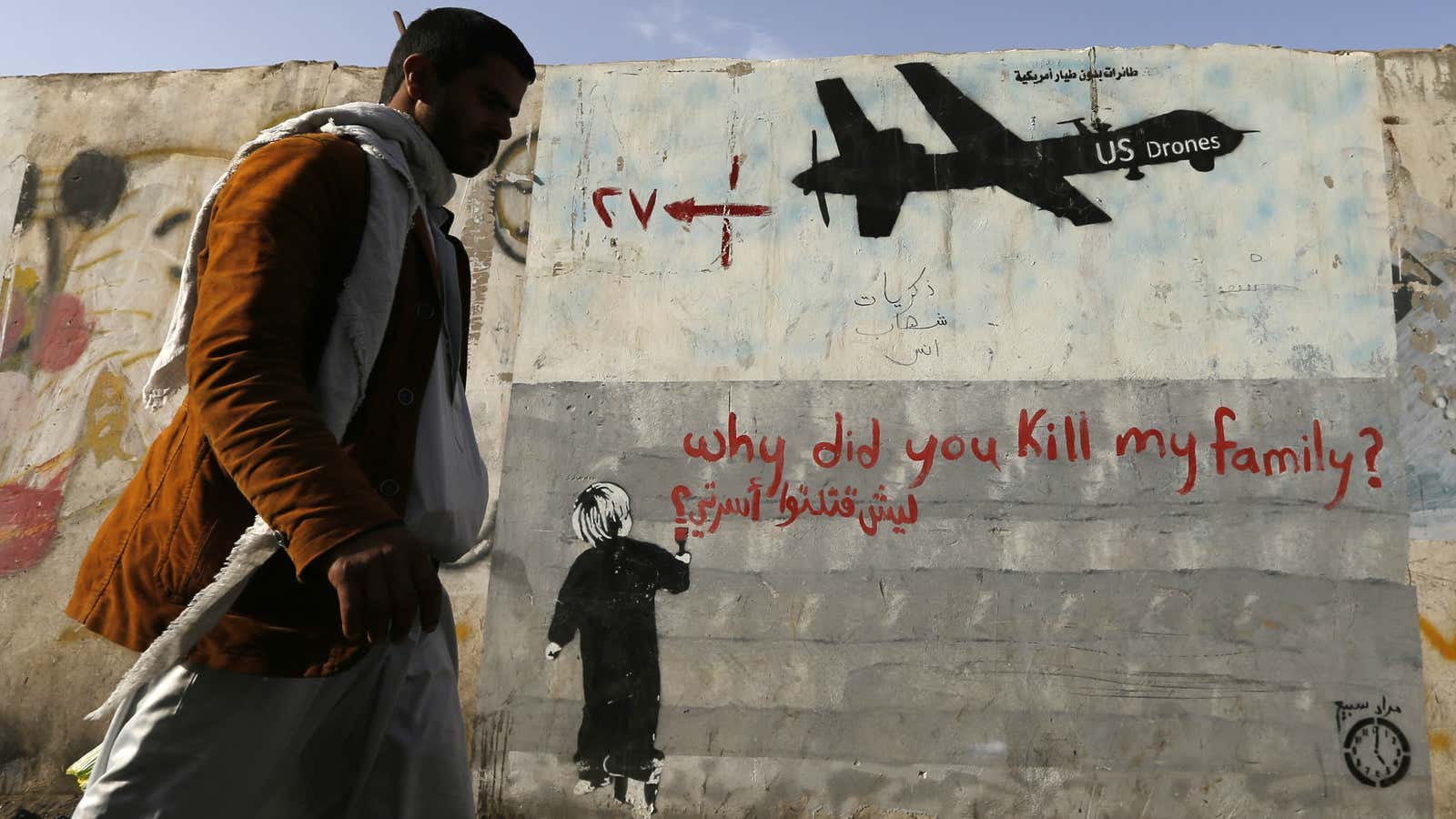The US government has been running a “shadow war” from outposts in Africa using drones and manned aircrafts to strike targets in the region. So reports the Intercept, citing a leaked internal 2013 Pentagon study.
Through a unit called Task Force 48-4, the US Africa Command, or Africom—the umbrella organization for US army activities on the continent—carried out operations in 2011 and 2012 from its headquarters in Djibouti, targeting terrorism suspects in Somalia and Yemen. Camp Lemonnier, as it is known, was a primary base for such operations. But there were “spokes” elsewhere in the region, the Intercept reports, citing defense secretary Ashton Carter. The Intercept provides a list of 14 other locations in Ethiopia, Kenya, Somalia, Uganda, and elsewhere in the region.
These efforts show evidence of Africom’s ramped up presence in Africa after the Arab Spring revolutions. The power vacuum that followed in countries such as Libya and Tunisia created an opening for militant extremists to operate more freely. Since then, Africom has been working with African governments to establish “staging areas, cooperative security locations and forward operating locations,” according to the report.
While Africom’s presence and its use of drones is not new, the Intercept’s reporting seems to show how much Africom’s operations have become reliant on the use of drones to “surveil and operate on larger and larger swaths of the continent—and, increasingly, to strike targets with drones and manned aircraft.” It also seems to contradict the US military’s assertion that it maintains only a “small footprint” in Africa.
The Intercept did not provide counts of the troops or weaponry involved, and the Pentagon refused to provide specific details of its Africom general activities in Africa and the extent of its use of drone warfare in the region. “Due to operational security, I won’t be able to give you the exact size and number,” an Africom spokesperson, told The Intercept.
Over the last few years, the US military has increased its use of drone strikes against terrorism suspects around the world, arguing that it offers a more surgical option. Despite critics arguing that the tactic kills more civilians than intended targets, the Intercept’s reporting shows how much drone warfare is now becoming a fixture of its counter-terrorism efforts in Africa.
The rise of al-Shabaab in Somalia, Boko Haram in Nigeria, and Islamist groups in Mali, all with declared or loose ideological affiliations with the terror group ISIL, have led the US army to step up its fight against terrorism on the continent.
And Camp Lemonnier has become a staging ground for operations, particularly in the use of Reaper and Predator drones to attack targets in the region, the Intercept reports. While drones from there have been used to attack al-Qaeda suspects in Yemen since 2002, their use had been limited. But al-Shabaab gains in Somalia and al-Qaeda Yemen’s attempted plot to bomb flights headed to the US led to a rethink of strategy. It was then that Camp Lemonnier was turned into a fully-fledged drone base. Operations carried out since then have led to the killing of the American-born cleric Anwar al-Awlaki in 2010, for example.
Last year, Washington signed a 20-year lease renewal for the use of Camp Lemonnier, paying $70 million annual rent, and doubling the amount paid previously, according to the National. The paper also reports that the US will spend an additional $1.4 billion to expand and upgrade the facility.
Brigadier general James B. Linder, Africom’s head of special operations, told the New York Times (paywall) in 2014 that between 5,000 and 8,000 US military personnel were operating in Africa, 700 of them special forces. “We have a real global threat,” Linder said then. “The problems in Africa are going to land on our doorstep if we’re not careful.”




